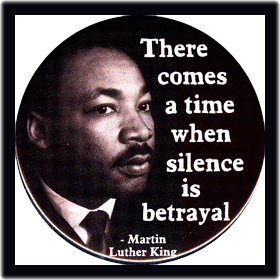-
Celebrating Black History Month 2013, Part I - Silence Is Betrayal
February 4, 2013
Have an opinion? Add your comment below. Most people use their social network in times of crisis, but when your whole social network is in crisis, there’s no ladder to climb out.
-
America's past has always had trouble competing for attention with its present. As we celebrate February Black History Month 2013, this month provides an opportunity that enables more African-Americans to re-live and reflect on their history on more occasions. It's a month of great events and crucial issues surrounded by a story that needs to be told.
During the time when white youngsters had to listen to black music late at night, hiding their portable transistor radio under the covers; during the time when black music was sold from under the counters or hidden in the back of record stores; and during the time when black music was more likely to be covered by white artists than allowed to be popularized by black artists, a few leaders recognized the injustice and had the courage and audacity to open the door for this music and its creators. This is just one example of why we say that some truths are not self-evident; that they must be told and re-told and why for them and for us, silence is betrayal.
There are those who say that we should look to ourselves for solutions to our most pressing problems. The problem with that notion is that we don't always hold the means to solve problems we didn't create.
These same people say it begins with the classic interplay between the aggrieved blacks and tolerant whites. As consummate victims we lay ourselves at the feet of our fellow citizens, exhibiting our lack of achievement as evidence of their failure, hoping to wring from their sense of conscience what we must assume, by the very logic of our claim, lies beyond our individual capacities to attain and achieve.

Here's a question many have thought about, but few have asked. How effective are suburban, middle-class "generation blingers" going to be in denying "status rewards" to rebellious ghetto teenagers who father illegitimate children? Welfare programs, it might be said, are what support "dysfunctional behaviors" in the ghetto. Change welfare … and this behavior has to change as well. And then we have to also include the overly simplistic notion that socioeconomic determinism is somehow to blame for the incentive provisions of certain government transfer programs and individual misbehavior.
Let's face it … we live in a new age. The United States of 2013 is not the same America of the 1970s, '80s, '90s or even the '00s. In those years and decades, a portion of which we're going to examine during this next four weeks, the air was filled with cries of civil rights, affirmative action, equal opportunity, "war on poverty," "The Great Society" and "Black is Beautiful."
While some progress is being made, for the most part because the Republican house is unwilling to work with and support our President, little is happening other than lip service from the government and the corporations involved, who seem to believe that somehow the covenants we've asked for will be implemented eventually and that we should continue to be patient. But America has been known to make promises along that line, first to the Native Americans and then to black slaves and now to Hispanics. History bears out how those promises have been kept and broken.

For some African-American leaders whose power depends on appealing to white guilt of the large inner-city ghetto with its population of poor blacks, this can be very useful as a symbol of continuing injustice. The suffering of the poorest African-Americans creates a fund of political capital upon which all members of the group can draw when pressing racially-based claims and including affirmative action preferences that some say go mainly to a growing segment of middle-class blacks.
Think it's hard to get a job in this economy?
Try being a young black man with an electronic monitoring bracelet on his ankle for a felony conviction. Unemployment in the black community is over 16%. And while unemployment for black women dropped from 13.2 % to 12.6%, the rate for black men rose from 17.3% to 17.6 %. There are now 1.4 million black men out of work nationally.
The numbers look even worse for black teens. While the overall teen population had an unemployment rate of 26%, the white teen population had 23.4% unemployment and black teens had 49%, up from 45.4%. To call economic conditions in the African-American community a crises is to understate the problem because the situation black men are finding themselves in could follow them for the rest of their careers.
Some of the reasons for the intractable problems are a function of economics as much as they are the product of generations of discrimination. For example, those living in a black community with high unemployment may have more problems finding new jobs because the people to whom they would naturally turn -- friends, families and neighbors -- are also experiencing high unemployment.
Black members of the middle class and upper-middle class may also be hurt by a lack of depth of wealth. A recent study by United For A Fair Economy, a Boston-based research organization, showed that for every dollar of net worth that white families have, black families have 10 cents.
College educated African-Americans typically have higher levels of student loan debt because their parents don't have a much money to finance their educations; black homeowners in African-American neighborhoods have homes with 10-15% less than comparable homes in white neighborhoods; and blacks at all levels of the income spectrum were targeted with subprime loans at a higher rate than whites. That means any bump in the road can be really be serious just because there is no wealth to back that up. Most people use their social network in times of crisis, but when your whole social network is in crisis, there's no ladder to climb out.

The New Ghettos

The new ghettos, with their gigantic shelters, busy social-service facilities and deteriorating housing, employ thousands of social workers, guards, correctional officers, nurses and physicians at a huge cost. They may become even costlier in their contribution to dependency, illness, delinquency and waste. As much as they are defined by what they do, they are also defined by what they lack.
The so-called "war on poverty," whose goal was to uplift the poor, has been redesigned to contain the poor and simply keep them alive.
America today, just ahead of the next national elections, is still for the most part a conservative land and its people are preoccupied with health care, jobs, education, social security and other economic issues, perhaps more selfishly than at any time since the 1960s.
It is important that at this time in American history, the African-American community put aside any philosophical differences and network together economically, if we are to have any hope of continuing to progress in this new America.
As we celebrate February, Black History Month, we must remember that some of us have the power within ourselves to save ourselves. We begin by seeking a solution for our underclass. And we have got to be willing to make an enemy and an example of anyone who stands in the way of that solution.
We must discontinue practicing the exhibitionism of non-achievement and with clear awareness acknowledge that along with founding fathers there were founding mothers. We have got to look forward to tomorrow, next February and beyond. We will have only ourselves to blame for not dealing with "the inherited nightmare." And if we remove the nightmare and replace it with more pleasant dreams, we then make America a better place for ourselves and we automatically make it a better place for our children.

Black History Month is not a time for silence and apathy, it is a time when those of us in radio need to recognize our responsibilities and take full advantage of our tremendous reach and influence and combine that with forward vision. For all those reasons, today, more than ever, silence is betrayal.
We look forward to celebrating the next four weeks with you. For past good and future promise we encourage you to join us. We want to remember those who gave their lives for simple justice. We want neither to mistake power for greatness, nor to celebrate those responsible for our worst nightmares.
Word.
(Next Week: Part II)
-
-
